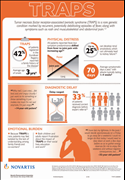Media

· Ilaris® (canakinumab) is the first and only US FDA-approved biologic treatment for patients with TRAPS, HIDS/MKD and FMF disease
· These three simultaneous approvals conducted under FDA Priority Review follow Breakthrough Therapy Designations to address the unmet need of patients
· Ilaris provides rapid, sustained and complete disease control for patients with these rare and debilitating Periodic Fever Syndromes
Basel, September 23, 2016 – Novartis announced today that the US Food and Drug Administration (FDA) has granted three simultaneous approvals for the expanded use of Ilaris® (canakinumab) to treat three rare and distinct types of Periodic Fever Syndromes.
Ilaris is the first and only FDA approved biologic treatment for Tumor Necrosis Factor-Receptor Associated Periodic Syndrome (TRAPS), Hyperimmunoglobulin D Syndrome (HIDS)/Mevalonate Kinase Deficiency (MKD) and Familial Mediterranean Fever (FMF). All three conditions are part of a group of rare autoinflammatory diseases called Periodic Fever Syndromes2, which are also referred to as Hereditary Periodic Fevers (HPF). The most common syndrome is FMF, which mainly affects people of Eastern Mediterranean ancestry. It affects 1 in 250 to 1 in 1,000 individuals in these populations, many of whom are children3.
“Gaining three simultaneous FDA approvals of Ilaris is a momentous turning point for people who suffer with these severe, debilitating diseases,” said Paul Hudson, CEO, Novartis Pharmaceuticals. “There is a significant unmet need in these conditions, particularly in children, and Novartis is proud to provide a new treatment option to those who so desperately need it.”
The FDA approvals are based on results from the pivotal Phase III CLUSTER study which showed rapid (at Day 15) and sustained disease control with Ilaris compared to placebo through 16 weeks, in patients with either TRAPS, HIDS/MKD or FMF1. As a result of the superior data, the FDA granted Ilaris Breakthrough Therapy status and priority reviews for each of the three Periodic Fever Syndrome conditions.
Periodic Fever Syndromes are a group of rare autoinflammatory diseases that cause disabling and persistent fevers which may be accompanied by joint pain, swelling, muscle pain and skin rashes with complications that can be life-threatening2. Ilaris is already approved and marketed in the US as an effective and well-tolerated treatment for another Periodic Fever Syndrome condition – Cryopyrin-Associated Periodic Syndromes (CAPS), and another autoinflammatory condition – Systemic Juvenile Idiopathic Arthritis (SJIA). In August 2016, the European Commission approved Ilaris for a license extension to also treat patients with Adult-Onset Still’s Disease (AOSD).
About Periodic Fever Syndromes
Periodic Fever Syndromes are a group of diseases that cause serious recurrent fever and pathogenic inflammation through non-infectious activation of the immune system. Most patients present with symptoms in infancy or childhood, but in some patients the condition only becomes apparent or diagnosed in adulthood2,3.
Previous treatments for these rare conditions consisted of oral anti-inflammatory drugs, such as corticosteroids, which were used only to help manage the symptoms. While other medicines, such as non-steroidal anti-inflammatory drugs, have also been used to help reduce symptoms, they do not prevent or change the overall course of a flare2.
About Ilaris
Ilaris is a selective, high-affinity, human monoclonal antibody that inhibits Interleukin-1 (IL-1) beta, which is an important part of the body's immune system defenses4. Excessive production of IL-1 beta plays a prominent role in certain inflammatory diseases5,6. Ilaris works by blocking the action of IL-1 beta for a sustained period of time, therefore inhibiting inflammation that is caused by its over-production4.
Ilaris is currently approved and marketed for the treatment of SJIA in the US and EU and for the treatment of AOSD and the symptomatic treatment of refractory acute gouty arthritis in the EU. Ilaris is also approved in more than 70 countries, including in the EU, Switzerland, Canada, and Japan for the treatment of the Periodic Fever Syndrome CAPS: rare, lifelong, genetic disorders with debilitating symptoms. In the US, Ilaris is approved for two subtypes of CAPS: Muckle-Wells Syndrome (MWS) and Familial Cold Autoinflammatory Syndrome (FCAS). The approved indications may vary depending upon the individual country.
Disclaimer
The foregoing release contains forward-looking statements that can be identified by words such as “Breakthrough Therapy Designations,” “Breakthrough Therapy,” or similar terms, or by express or implied discussions regarding potential new indications or labeling for Ilaris, or regarding potential future revenues from Ilaris. You should not place undue reliance on these statements. Such forward-looking statements are based on the current beliefs and expectations of management regarding future events, and are subject to significant known and unknown risks and uncertainties. Should one or more of these risks or uncertainties materialize, or should underlying assumptions prove incorrect, actual results may vary materially from those set forth in the forward-looking statements. There can be no guarantee that Ilaris will be submitted or approved for any additional indications or labeling in any market, or at any particular time. Nor can there be any guarantee that Ilaris will be commercially successful in the future. In particular, management’s expectations regarding Ilaris could be affected by, among other things, the uncertainties inherent in research and development, including unexpected clinical trial results and additional analysis of existing clinical data; unexpected regulatory actions or delays or government regulation generally; the company’s ability to obtain or maintain proprietary intellectual property protection; general economic and industry conditions; global trends toward health care cost containment, including ongoing pricing pressures; unexpected safety, quality or manufacturing issues, and other risks and factors referred to in Novartis AG’s current Form 20-F on file with the US Securities and Exchange Commission. Novartis is providing the information in this press release as of this date and does not undertake any obligation to update any forward-looking statements contained in this press release as a result of new information, future events or otherwise.